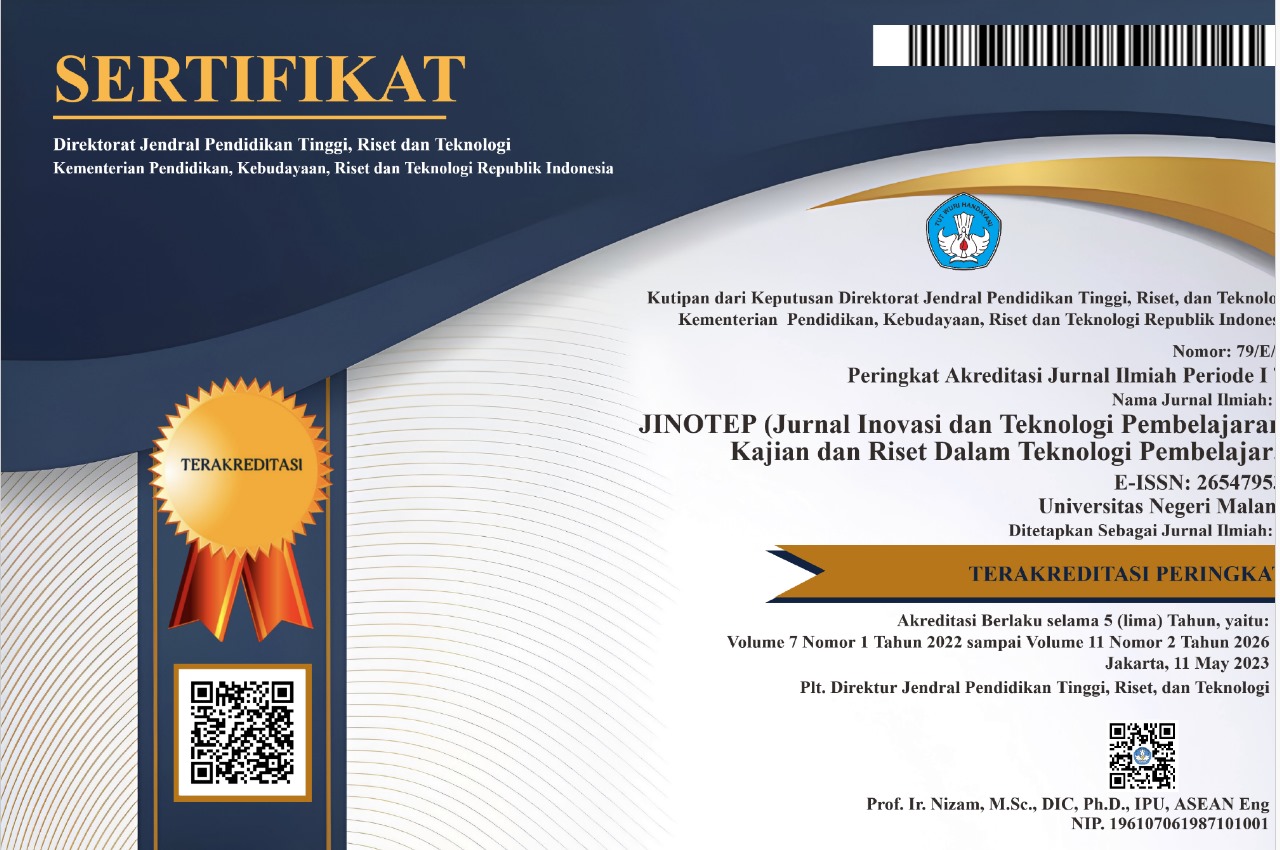Analyzing the use of information technology in guidance and counseling services in Indonesia and Tanzania: A narrative review
Abstract
Abstract: In light of rapid advancements in information technology, school counselors must modify their guidance and counseling services to reflect these changes. Unfortunately, there is a paucity of information about how counselors use IT, especially in Tanzania and Indonesia. This study aims to analyze how these two countries use information technology for guidance and counseling services. A total of 100 international and national articles have been reviewed from 2014 to 2024 in Google Scholar, while 25 articles have been selected using the PRISMA model. School counselors use computers, smartphones, Microsoft Word, PDFs, WhatsApp, Zoom, and Google Meet. However, they encounter difficulties, such as inadequate ICT skills and lack of training. Consequently, they frequently learn new digital abilities from their work colleagues. Further studies on ICT use in these nations are required, as well as an investigation of government efforts to enhance digital literacy specifically for school counselors.
Keywords
Full Text:
PDFReferences
Abudabbous, N. (2022). Advantages and disadvantages of social media and its effects on young learners. ssrn electronic journal, march. https://doi.org/10.2139/ssrn.4002626
Afdilah, I. H., Hidayah, N., & Lasan, B. B. (2020). A literature review; the role of bk teachers developing spiritual intelligence in the pandemic era (covid-19): based on online learning. konselor, 9(2), 153–164. https://doi.org/10.24036/0202093109050-0-00
Alhadi, S., Supriyanto, A., & Dina, D. A. M. (2016). Media in guidance and counseling services: a tool and innovation for school counselor. Schoulid: Indonesian Journal of School Counseling, 1(1), 6. https://doi.org/10.23916/schoulid.v1i1.35.6-11
Amalianita, B., Ifdil, I., Agustin, A. W., & Zikra, Z. (2017). The role online counseling as a part of guidance and counseling services. Schoulid: Indonesian Journal of School Counseling, 2(3), 65. https://doi.org/10.23916/08457011
Asare, S., Agyeman, E. P., Ahmoah, J. D., & Asare, B. O. (2023). A systematic review of the role of social media in providing guidance and support to adolescents: a case study of online counseling platforms. American journal of Multidisciplinary Research and Innovation, 2(6), 42–48. https://doi.org/10.54536/ajmri.v2i6.2213
Budianto, A. E., Aziz, A., & Hidayah, N. (2019). Ict application in cyber counseling as a teacher accelerator with optimizing WhatsApp based mobile computing. Journal of Physics: Conference series, 1375(1). https://doi.org/10.1088/1742-6596/1375/1/012006
Chilewa, E. A., & Osaki, K. (2022). The effectiveness of guidance and counseling practices on students' career development in secondary schools in Temeke municipality. Journal of Humanities and Education development, 4(1), 160–181. https://doi.org/10.22161/jhed.4.1.17
Crandall, K. S., North, M., & Crandall, K. (2020). Digitally transforming the professional school counselor. Issues in information systems, 21(1), 1–11. https://doi.org/10.48009/1_iis_2020_1-11
Deslonde, V., & Becerra, M. (2018). The technology acceptance model (tam): exploring school counselors' acceptance and use of naviance. The professional counselor, 8(4), 369–382. https://doi.org/10.15241/vd.8.4.369
Dolot, A. (2018). The characteristics of generation z. e-mentor, 74, 44–50. https://doi.org/10.15219/em74.1351
Efendi, B. A., & Wangid, M. N. (2022, December). Utilization of Information Technology in Guidance and Counseling Services During the Covid-19 Pandemic. In Annual Conference on Research, Educational Implementation, Social Studies and History (AREISSH 2021) (pp. 5-12). Atlantis Press. https://doi.org/10.2991/978-2-494069-17-6_2
Fahriza, I., Supriatna, M., Suryahadikusumah, A. R., & Fitrah, S. (2023). Technology framework i n guidance and counseling services technology framework in guidance and counseling services. january. https://doi.org/10.30653/001.202371.247
Gai Mali, Y. C., Kurniawan, D., Januardi, J. I., Swara, S. J., Lokollo, N. C. E., Picauly, I. A., Paramitha, N. G., Tanore, J. A., Dewani, M. S., & Pakiding, R. W. (2023). Issues and challenges of technology use in Indonesian schools: implications for teaching and learning. ijiet (International Journal of Indonesian education and Teaching), 7(2), 221–233. https://doi.org/10.24071/ijiet.v7i2.6310
Goodrich, K. M., Kingsley, K. V., & Sands, H. C. (2020). Digitally responsive school counseling across the asca national model. International Journal for the Advancement of Counselling, 42(2), 147–158. https://doi.org/10.1007/s10447-020-09396-9
Haryati, A. (2020b). Online counseling sebagai alternatif strategi konselor dalam melaksanakan pelayanan e-counseling di era industri 4.0. bulletin of counseling and psychotherapy, 2(2), 27–38. https://doi.org/10.51214/bocp.v2i2.33
Jaber, F., & Al-Hroub, A. (2023). School counselors' perceptions of virtual counseling in Lebanon: a qualitative study. frontiers in psychology, 13(january). https://doi.org/10.3389/fpsyg.2022.1083644
Joyce-Gibbons, A., Galloway, D., Mollel, A., Mgoma, S., Pima, M., & Deogratias, E. (2018). Mobile phone use in two secondary schools in Tanzania. education and information technologies, 23(1), 73–92. https://doi.org/10.1007/s10639-017-9586-1
Kafyulilo, A. (2014). Access, use and perceptions of teachers and students towards mobile phones as a tool for teaching and learning in tanzania. education and information technologies, 19(1), 115–127. https://doi.org/10.1007/s10639-012-9207-y
Kholiq, A., & Solehuddin, M. (2020). The use of facebook as a media for career guidance and counseling services in junior high school. 438(aes 2019), 224–228. https://doi.org/10.2991/assehr.k.200513.050
Kurniasih, C., Rodhiyya, Z. A., Hanum, N. C., Bhakti, C. P., & Fithroni, F. (2022, April). The Urgency of Technology Competencies for Guidance and Counseling Teacher. In International Seminar on Innovative and Creative Guidance and Counseling Service (ICGCS 2021) (pp. 58-61). Atlantis Press. https://doi.org/10.2991/assehr.k.220405.011
Kweka, K. H., & Ndibalema, P. (2018). Constraints hindering adoption of ICT in government secondary schools in Tanzania: The case of Hanang District. International Journal of Educational Technology and Learning, 4(2), 46-57. https://doi.org/10.20448/2003.42.46.57
La Torre, G., Backhaus, I., & Mannocci, A. (2015). Rating for narrative reviews: concept and development of the International Narrative Systematic Assessment tool. Senses and Sciences, 2(2), 31-35. https://doi.org/10.14616/sands-2015-1-3135
Malekani, A. A. (2018). Access to, use and challenges of icts in secondary schools in tanzania: a study of selected secondary schools in morogoro municipality. information impact: Journal of Information and Knowledge Management, 9(2), 44–57. https://doi.org/10.4314/iijikm.v9i2.4
Mason, E. C. M., Griffith, C., & Belser, C. T. (2019). School counselors' use of technology for program management. Professional School Counseling, 22(1), 1–10. https://doi.org/10.1177/2156759x19870794
Mulawarman, M., Susilawati, S., Syifa, L., & Rifani, E. (2020). Classroom guidance strategy with flipped method in guidance and counseling services at Indonesia schools in the digital era. Islamic Guidance and Counseling Journal, 3(2), 61–74. https://doi.org/10.25217/igcj.v3i2.646
Ndibalema, P. (2014). Teachers’ attitudes towards the use of information communication technology (ICT) as a pedagogical tool in secondary schools in Tanzania: The Case of Kondoa District. International Journal of Education and Research, 2(2), 1-16.
Ndume, V. A., Kisanga, D. H., & Selemani, M. (2021). Integrating ict in Tanzania secondary schools: experience of Tanzania as it grows to second world economy. International Academic Journal of Education & Literature, 2(5), 81–95. https://doi.org/10.47310/iajel.2021.v02i05.010
Ngao, A. I., Sang, G., & Kihwele, J. E. (2022). Understanding teacher educators' perceptions and practices about ict integration in teacher education program. education sciences, 12(8). https://doi.org/10.3390/educsci12080549
Nye, B. D. (2015). Intelligent tutoring systems by and for the developing world: a review of trends and approaches for educational technology in a global context. International journal of Artificial Intelligence in Education, 25(2), 177–203. https://doi.org/10.1007/s40593-014-0028-6
Oreku, G. S. (2022). Ict in education: mapping digital learning initiatives in Tanzania. Literacy Information and Computer Education Journal, 13(1), 3684–3703. https://doi.org/10.20533/licej.2040.2589.2022.0486
Putri, T. R., Supriyanto, A., Martaningsih, S. T., & Rosada, U. D. (2022). School counselor professional competence (pc-sc): social media utilization in guidance and counselling services (gc-s). counsellia: Jurnal Bimbingan dan Konseling, 12(1), 36. https://doi.org/10.25273/counsellia.v12i1.10846
Ramli, M. B., Mega, N., & Saputra, A. (2023). The Impact of Covid-19 on School Counselor Services. In International Conference on Educational Management and Technology (ICEMT 2022) (pp. 107-112). Atlantis Press. https://doi.org/10.2991/978-2-494069-95-4
Ramli, M., Hidayah, N., Eva, N., Saputra, N. M. A., & Hanafi, H. (2021). Counselor needs analysis on the development of a website-based reality counseling self-help model for reducing academic stress for high school students. proceedings - 2021 7th international conference on education and technology, icet 2021, 266–271. https://doi.org/10.1109/icet53279.2021.9575100
Retnawati, E. (2019). Efforts to support and expand the use of educational technology as a means of delivering learning. ijiet (International Journal of Indonesian Education and Teaching), 3(1), 128–137. https://doi.org/10.24071/ijiet.v3i1.1725
Rodliyatun, M., Sutrisno, S., Salaeh, A., & Iqdami, M. N. (2022). School counselors' efforts in implementing career guidance services. pamomong: Journal of Islamic Educational Counseling, 3(2), 85–98. https://doi.org/10.18326/pamomong.v3i2.85-98
Sare, Y. D., Hidayah, N., & Rahman, D. H. (2020). Historical guidance and counseling perspective in Indonesia. In 6th International Conference on Education and Technology (ICET 2020) (pp. 389-392). Atlantis Press. https://doi.org/10.2991/assehr.k.201204.075
Selcuk, A. A. (2019). A guide for systematic reviews: prisma. Turkish archives of otorhinolaryngology, 57(1), 57–58. https://doi.org/10.5152/tao.2019.4058
Sepriati, E., Qurniati, Q., Dharminto, M., Hoiriyah, E., & Zahara, E. (2022). Implementasi peraturan menteri pendidikan nasional ri nomor 27 tahun 2008 tentang standar kualifikasi akademik dan kompetensi konselor di SMA Bhakti Suci Jaya Tanjung Batu Kabupaten Ogan Ilir. Jurnal Ilmu Administrasi dan Studi Kebijakan (jiask), 4(2), 97–112. https://doi.org/10.48093/jiask.v4i2.85
Snow, W. H., & Coker, J. K. (2020). Distance counselor education: past, present, future. The professional counselor, 10(1), 40–56. https://doi.org/10.15241/whs.10.1.40
Susanto, E. (2014). Technology guidance and counselling: implementation theory in practice, development and experience. in The Current Issue of Guidance and Counseling. https://doi.org/10.13140/rg.2.1.1983.4084
Szymkowiak, A., Melović, B., Dabić, M., Jeganathan, K., & Kundi, G. S. (2021a). Information technology and gen z: the role of teachers, the internet, and technology in the education of young people. Technology in society, 65(january). https://doi.org/10.1016/j.techsoc.2021.101565
Szymkowiak, A., Melović, B., Dabić, M., Jeganathan, K., & Kundi, G. S. (2021b). Information technology and gen z: the role of teachers, the internet, and technology in the education of young people. Technology in society, 65(december 2020). https://doi.org/10.1016/j.techsoc.2021.101565
Wilder, C. (2018). Promoting the role of the school counselor. Journal of Professional Counseling: Practice, Theory & Research, 45(2), 60–68. https://doi.org/10.1080/15566382.2019.1646085
Woo, H., Dondanville, A., Jang, H., Na, G. E., & Jang, Y. (2020). A content analysis of the counseling literature on technology integration: American Counseling Association (ACA) counseling journals between 2000 and 2018. International Journal for the Advancement of Counselling, 42(3), 319–333. https://doi.org/10.1007/s10447-020-09406-w
Zamroni, E., Hanurawan, F., Hambali, I., & Hidayah, N. (2022). Trends and research implications of guidance and counseling services in Indonesia from 2010 to 2020 : a bibliometric analysis. SAGE Open, 12(2), 21582440221091261. https://doi.org/10.1177/21582440221091261
DOI: http://dx.doi.org/10.17977/um031v11i22024p066
Refbacks
- There are currently no refbacks.
Copyright (c) 2024 Subira Kaserero, Muslihati, Muhammad Ramli

This work is licensed under a Creative Commons Attribution-ShareAlike 4.0 International License.
======================================================================
Jurnal Inovasi dan Teknologi Pembelajaran published by Universitas Negeri Malang in collaboration with the Asosiasi Program Studi Teknologi Pendidikan Indonesia (APS TPI) and Ikatan Profesi Teknologi Pendidikan Indonesia (IPTPI) with a MoU.
Publisher Address:
Educational Technology Laboratorium, Building D5, 1st Floor
Faculty of Education, Universitas Negeri Malang
Semarang St. No. 5, Malang City, East Java Province, Postal Code 65145
Email: jinotep.fip@um.ac.id
======================================================================

JINOTEP is licensed under a Creative Commons Attribution-ShareAlike 4.0 International License.
JINOTEP Statistics (Since July 13th, 2020)



.png)




.png)
1.png)
1.png)
4.png)
2.png)
1.png)
1.png)
.png)


_3.png)





1.png)
.png)